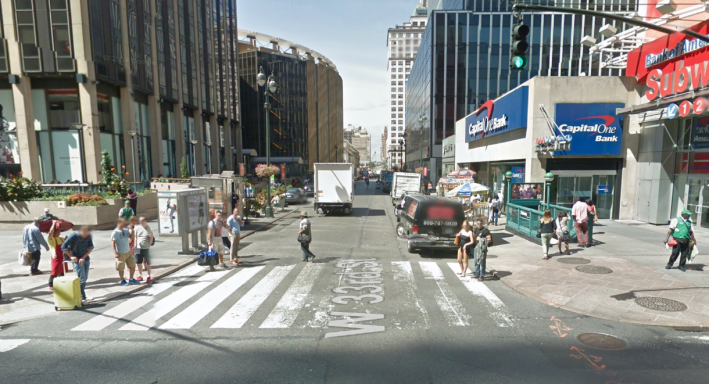
Real estate giant Vornado Realty Trust last night unveiled plans to open up space for people on a couple of busy blocks near Penn Station. The proposed car-free zones include a new pedestrian plaza on 33rd Street west of Seventh Avenue. Phase one will consist of a three-month trial this summer and fall, and the changes could be made permanent afterward.
Vornado is proposing to make part of 33rd Street off-limits to through traffic, creating a pedestrian plaza from Seventh Avenue to the Madison Square Garden loading docks about halfway down the block toward Eighth Avenue. Vornado executives told CB 5 the space could be used for seating or events, reports Bloomberg.
The company is also proposing more limited extensions of pedestrian space on 32nd Street between Seventh Avenue and Sixth Avenue. The street will get a sidewalk extension along the entire north side of the block, as well as plantings on the south side of the block near Seventh Avenue, with traffic trimmed to one lane. The pedestrian areas will connect with plazas at Herald Square.
The proposal received a unanimous endorsement at a joint meeting of the Community Board 5 parks and transportation committees last night, reports Transportation Alternatives senior organizer Tom DeVito. It now advances to the full board on June 11.
Endorsing the plan were the 34th Street Partnership, the Municipal Art Society, and the American Cancer Society Hope Lodge, which uses 32nd Street for loading and access. DOT also supports the trial project, an agency spokesperson said, and will work with Vornado to measure conditions before and after installation. Vornado has hired Sam Schwartz Engineering to monitor 10 nearby intersections during the trial period, the company said.
The three-month pilot will be in place from July 18 to October 11, said Vornado spokesperson Bud Perrone. “This is truly a trial period to decide how it works," he said, "and if people decide to move forward with it, there would be a public process."
Community board members last night wanted to ensure that the project would not encourage additional street vending, DeVito said, and they asked Vornado to use high-quality materials for the trial project. Perrone did not have any information on the materials that will be used, and would not release a copy of the presentation Vornado made to CB 5.
Vornado is a major property owner in the area, with holdings including Penn Plaza, the Hotel Pennsylvania, and the Manhattan Mall. The company will be paying for the project; Perrone said an exact cost estimate had yet to be determined.
More changes could be on the way. The real estate giant has hired Norwegian architecture firm Snøhetta, which designed the permanent Times Square plazas, to develop "a 'framework' for the redesign of Vornado’s buildings and street-level spaces in Penn Plaza," reports Bloomberg.





